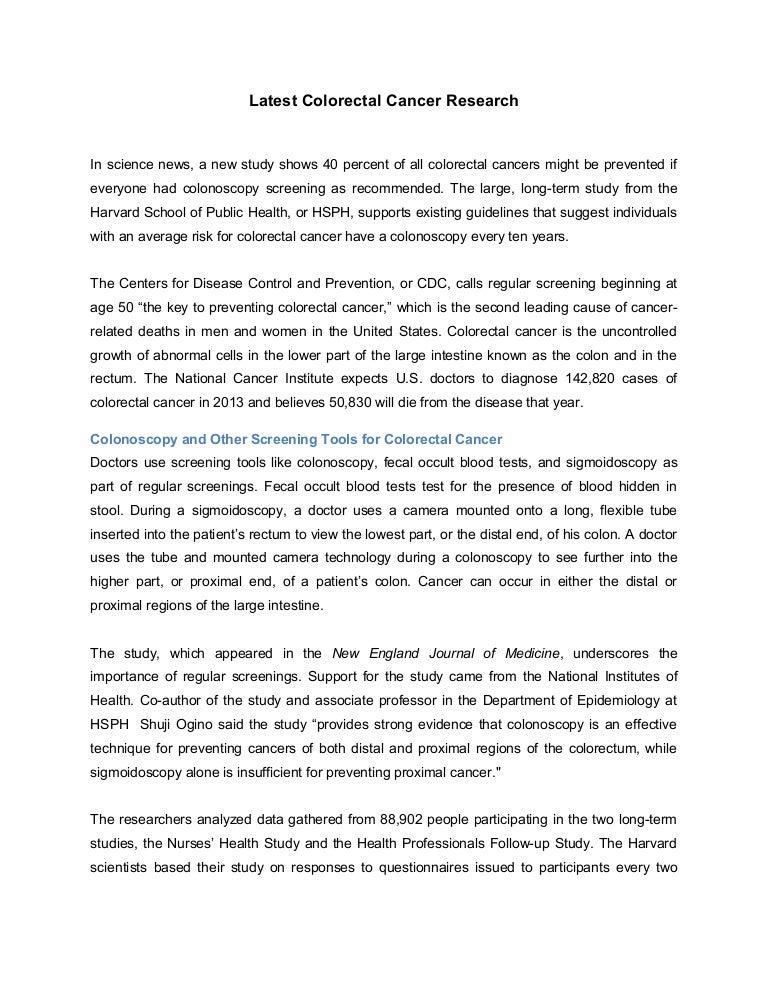Downloadable Content
Colorectal cancer is defined as malignant tumours in the colon or rectum, distributed on approximately 2/3 and 1/3 of diagnosed patients, respectively [22]. About 95% of the colorectal tumours are adenocarcinomas from glandular epithelium. In Denmark, 46% of patients with colon cancer and 37% of patients with rectal cancer are women [8].File Size: 2MB increased colorectal cancer risk may occur. The commonest are Hereditary Non-Polyposis Colorectal Cancer (HNPCC), which accounts for around % of colorectal cancer diagnosis without polyposis and is caused by mutations in mismatch repair genes and Familial Adenomatous Polyposis caused by mutations in the APC gene. In this thesis two related The primary focus of this thesis is on cancer cells of different invasive potential, and char- acterization of inherent properties that differ between non-invasive and invasive strains of similar origin. To understand our motivation we will outline some of the main aspects of cancer cells, especially in respect to their survival and spreading

INTRODUCTION
· Abstract Background: Inflammatory bowel diseases (IBD) are a major risk factor for colon cancer. Intestinal microbiota have been identified as the target of inflammation that affects the progression of colitis-associated colorectal cancer (CAC) increased colorectal cancer risk may occur. The commonest are Hereditary Non-Polyposis Colorectal Cancer (HNPCC), which accounts for around % of colorectal cancer diagnosis without polyposis and is caused by mutations in mismatch repair genes and Familial Adenomatous Polyposis caused by mutations in the APC gene. In this thesis two related · Colorectal cancer (CRC) is the third most common cancer and the second most common cause of cancer deaths worldwide. The International Agency for Research on Cancer estimated that there were million new cases of CRC and deaths from CRC in

· This thesis investigates three different aspects of colorectal cancer caused by a genetic susceptibility. Through these three separate studies this thesis aims to understand the relationship between molecular genetics and the screening for, clinical behaviour of and outcomes following colorectal blogger.com: Katherine Newton · Colorectal cancer (CRC) is the third most common cancer and the second most common cause of cancer deaths worldwide. The International Agency for Research on Cancer estimated that there were million new cases of CRC and deaths from CRC in Background: Colorectal cancer is the third most common cancer in the UK for both men and women. Survival rates are improving and more than half of those diagnosed will survive for more than five years. The configuration of care for colorectal cancer patients is likely to shift in line with survivorship strategies which favour self care, a personalised approach, a holistic Author: Susan Browne
· Abstract Colorectal cancer (CRC) is the second most frequent cause of cancer-related death worldwide. Detecting CRC in a premalignant or early stage can improve survival of patients. When the CRC is metastasized (mCRC) to other organs patients are offered systemic treatment to prolong survival increased colorectal cancer risk may occur. The commonest are Hereditary Non-Polyposis Colorectal Cancer (HNPCC), which accounts for around % of colorectal cancer diagnosis without polyposis and is caused by mutations in mismatch repair genes and Familial Adenomatous Polyposis caused by mutations in the APC gene. In this thesis two related Genetic mechanisms in colorectal polyposis. PhD Thesis, Cardiff University. Item availability restricted. Abstract Individuals with >/= 10 colorectal adenomas have traditionally been referred for genetic testing to identify APC and MUTYH mutations which cause Familial Adenomatous Polyposis (FAP) and MUTYH-Associated Polyposis (MAP) respectively

Early-Onset Colorectal Cancer By Noor Kammonah A Thesis Submitted to the Faculty of Graduate Studies through the School of Computer Science in Partial Fulfillment of the Requirements for the Degree of Master of Science at the University of Windsor Windsor, Ontario, Canada © Noor Kammonah increased colorectal cancer risk may occur. The commonest are Hereditary Non-Polyposis Colorectal Cancer (HNPCC), which accounts for around % of colorectal cancer diagnosis without polyposis and is caused by mutations in mismatch repair genes and Familial Adenomatous Polyposis caused by mutations in the APC gene. In this thesis two related Background: Colorectal cancer is the third most common cancer in the UK for both men and women. Survival rates are improving and more than half of those diagnosed will survive for more than five years. The configuration of care for colorectal cancer patients is likely to shift in line with survivorship strategies which favour self care, a personalised approach, a holistic Author: Susan Browne
No comments:
Post a Comment